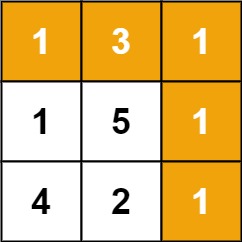LeetCode in Cpp
64. Minimum Path Sum
Medium
Given a m x n grid filled with non-negative numbers, find a path from top left to bottom right, which minimizes the sum of all numbers along its path.
Note: You can only move either down or right at any point in time.
Example 1:

Input: grid = [[1,3,1],[1,5,1],[4,2,1]]
Output: 7
Explanation: Because the path 1 → 3 → 1 → 1 → 1 minimizes the sum.
Example 2:
Input: grid = [[1,2,3],[4,5,6]]
Output: 12
Constraints:
m == grid.lengthn == grid[i].length1 <= m, n <= 2000 <= grid[i][j] <= 100
Solution
#include <vector>
#include <algorithm>
class Solution {
public:
int minPathSum(std::vector<std::vector<int>>& grid) {
if (grid.size() == 1 && grid[0].size() == 1) {
return grid[0][0];
}
int m = grid.size();
int n = grid[0].size();
std::vector<std::vector<int>> dm(m, std::vector<int>(n, 0));
int s = 0;
// Initialize the last column
for (int r = m - 1; r >= 0; --r) {
dm[r][n - 1] = grid[r][n - 1] + s;
s += grid[r][n - 1];
}
s = 0;
// Initialize the last row
for (int c = n - 1; c >= 0; --c) {
dm[m - 1][c] = grid[m - 1][c] + s;
s += grid[m - 1][c];
}
return recur(grid, dm, 0, 0);
}
private:
int recur(std::vector<std::vector<int>>& grid, std::vector<std::vector<int>>& dm, int r, int c) {
int m = grid.size();
int n = grid[0].size();
if (dm[r][c] == 0 && r != m - 1 && c != n - 1) {
dm[r][c] = grid[r][c] + std::min(recur(grid, dm, r + 1, c), recur(grid, dm, r, c + 1));
}
return dm[r][c];
}
};

